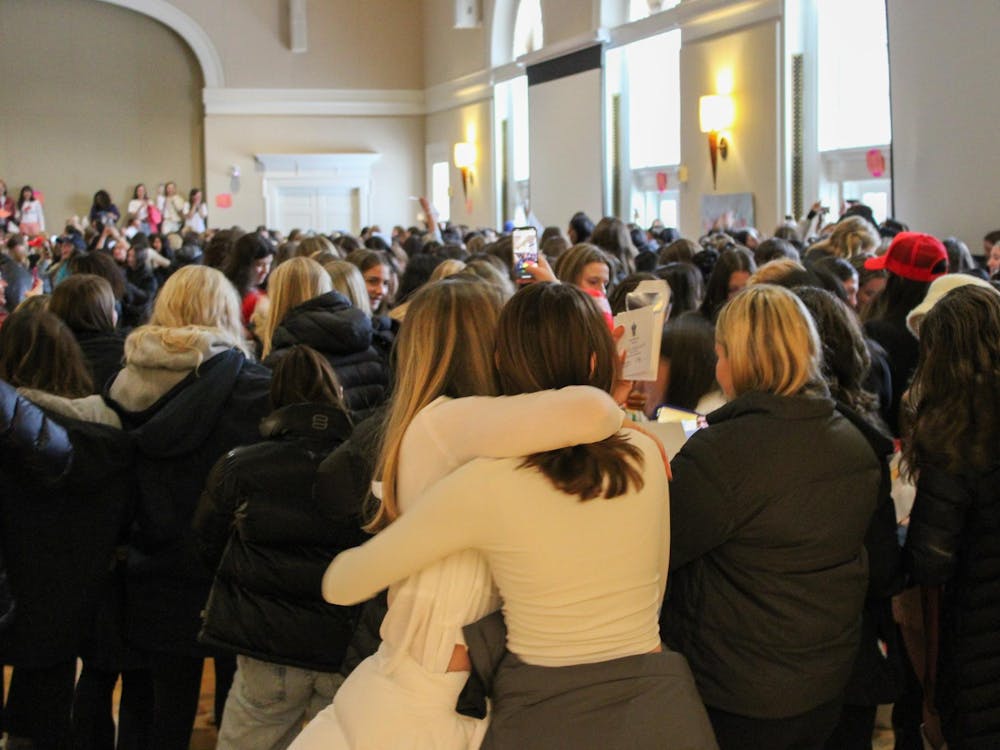"¡Silencio!"
Actors stop shuffling and the hum of their voices draws to a close at the request of Fernando Opere, Spanish Professor and founder of the University Spanish Theatre Group. He moves to the edge of the stage and waits for them to assume their positions for the next scene.
Dressed in blue jeans and a casual green shirt, Opere does not fit the stereotypical image of a director. And he certainly isn't sitting in a black, high-back chair. His enthusiasm for drama, though, is unquestionably intact.
Opere and members of the University's Spanish Theater Group were rehearsing last Wednesday night for this weekend's production of "Bodas de sangre" (Blood Wedding), a 70-year-old play written by Spanish author Federico Garcia Lorca.
With white panels as a backdrop and a couple of tables and chairs among the only props on stage, the scene is simple and stark. But listening to Lorca's lyrical language roll off the actors' tongues, cozy Helms Theatre quickly becomes much more than wooden tables and white boards.
"This is where the text starts to make sense," Ph.D. student Sam Amago said.
Although Amago has both read and taught "Bodas de sangre," he said that acting out the drama is the only way to see the "real people, feelings and passion" involved.
"It's like breathing life into the text," Amago said.
"Bodas de sangre," the Spanish Theatre Group's 23rd annual production is not Amago's first performance.
"By now, Opere knows what I can and what I can't do," Amago said.
Although many of the group members --including students, faculty and community members--are veterans, others will make their
debut. According to Amago, however, all share a certain excitement for drama and a desire to make the words jump off the page.
Amago, who plays the role of Leonardo, the childhood lover of the bride in the play, said his character is challenging to depict.
"Although Leonardo is passionate," Amago said, "it's challenging to show that he has uncontrollable passion but at the same time is controlling it."
Because of the suppression of the lovers' feelings by their feuding families, Leonardo now is married to another woman, and the bride plans to marry another man.
The intense love between Leonardo and the bride, however, leads them to run off together on Bride's wedding night. The supposedly joyous occasion ends in tragedy when the lovers are furiously pursued in the moonlight by their families and wedding guests.
Although the plot may seem complicated, Opere's passion for drama and directing makes it seem effortless.
At last week's rehearsal, Opere energetically demonstrated to the actors how to walk across the stage, the thud of his feet echoing as they pounded the stage beneath him. A few minutes later, he gave another presentation, showing actors how to speak from deep within so the sound would project.
"He's wonderful," said History Prof. Tico Braun, of Opere. "I couldn't do a play not directed by him."
Braun, who plays the father of the Bride, described Opere as "soft, loving, and supportive."
"He's rarely critical," Braun said, "and he brings out the best in the actors."
Involved with the Spanish Theater Group for the past 11 years, Braun said he enjoys the change of pace from the more academic side of things.
"I have control in my classes, but I come here and I'm not in control anymore," said Braun.
Braun also said it's fun to become the character and be able to depend on the rest of the cast.
"I like to try to be someone else and see if it works," he said. "It gets tiring to be myself all the time."
In addition, Braun said he thinks that being part of the group is a great chance to "work with young people on a more equal basis."
Opere agreed.
"It's the best way to get to know people--students and others--outside of the confines of class," he said.
In fact, he sometimes even makes slight changes in a play based on what will work best about a particular group of people. For instance, Opere chose to add flamenco guitar music during the wedding party scene in "Bodas de sangre."
"You have to learn to solve difficulties," Opere said, "which sometimes means adding small things that aren't written in the play."
What is written in the play, though, is Lorca's powerful verse. One of Spain's most well-known and well-read poets and dramatists, Lorca was part of a prestigious group of artists called the '27 Generation. He was assassinated for his leftist beliefs at the beginning of the Spanish Civil War in 1936.
Nearly seven decades later, the intensity and musical quality of Lorca's language remains. Amago said that the rhythm in the play made it easier to memorize his lines, since he knows how many syllables fit in certain places.
Opere, who is familiar with the Andalucian region of southern Spain where Lorca spent much of his life, said he also appreciates Lorca's poetry.
"I love his poetry," Opere said. "I feel I understand Lorca well."
On the other hand, Opere also expressed the difficulty of presenting such a classic text as "Bodas de sangre" because of its poetic and symbolic nature. Despite the challenges, though, Opere said he is more excited than nervous about this weekend's show. He emphasized the value of students having access to foreign language experience.
"It's important to provide students with more opportunities like theater that go beyond just learning the language to seeing and hearing it," he said.
This weekend at the University, audiences will be able to do just that. The group also has been invited to perform at other colleges such as Washington & Lee, Mary Baldwin, Randolph Macon, the University of Richmond and Wake Forest University.
People can witness for themselves the Spanish Theatre Group's portrayal of Lorca's love and passion.
"I still get butterflies in my stomach," Braun said, admitting that for him, everything comes together only about five minutes before the play starts.
"It's excruciatingly difficult," he said, "and you never really know if it'll be decent or not."
Opere compared putting on a play to the annual Las Fallas tradition in Valencia, Spain, where people spend a great deal of time and money to construct elaborate figures, only to burn them on the last day of the celebration.
"Working on a play is like when you've been building something for a long time, then you burn it and it's gone," Opere said. "It's life. It's romantic and it's beautiful."
The Spanish Theater Group will present "Bodas de sangre" February 6th, 7th and 8th at 8 p.m. and February 8th and 9th at 2 p.m. at Helms Theater. Advance tickets ($10 general, $5 students) are available at 115 Wilson Hall.





